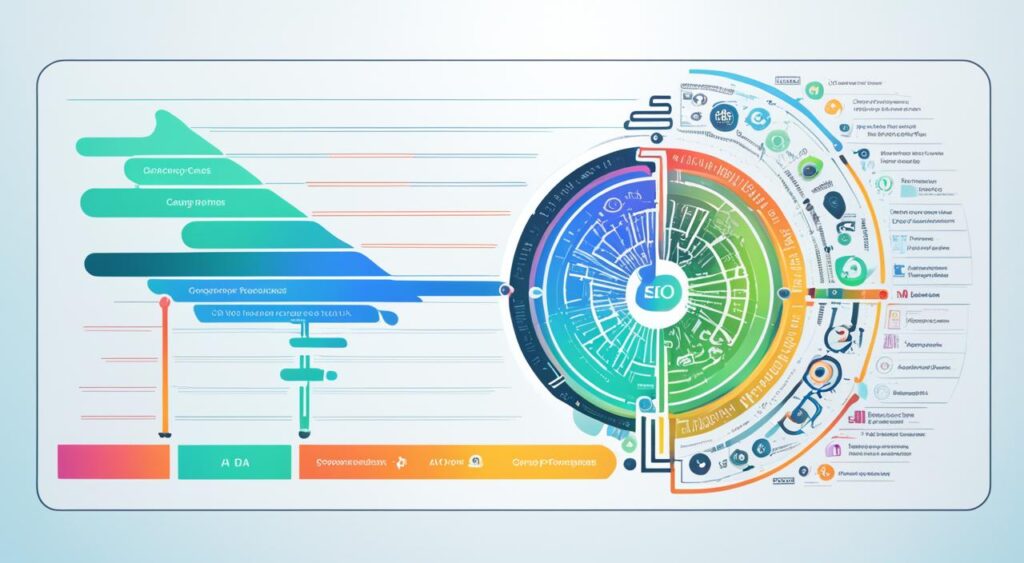Did you know that AI-driven SEO strategies can lead to a whopping 53% improvement in search rankings? The integration of Artificial Intelligence (AI) in SEO is revolutionizing the way businesses optimize their online presence and stay ahead in the digital landscape.
In today’s highly competitive online world, having a strong SEO strategy is essential for businesses to drive organic traffic and gain visibility. AI takes SEO to the next level by offering tailored solutions, automation, and data-driven insights that can greatly enhance SEO performance.
From optimizing content for search engines to understanding user behavior, AI brings numerous benefits to the table. In this article, we will explore the power of AI in SEO, the advantages it offers, its limitations, and its relationship with traditional SEO techniques.
Key Takeaways:
- AI-driven SEO strategies can lead to a 53% improvement in search rankings.
- AI in SEO offers tailored solutions, automation, and data-driven insights.
- Understanding user behavior through AI-powered analytics enhances SEO performance.
- AI brings advantages like efficiency, content generation, and predictive analytics to SEO.
- Collaboration between AI and human expertise is crucial for successful SEO.
AI-Driven Analytics for Understanding User Behavior and Content Optimization.
A successful SEO strategy involves understanding user behavior and optimizing content to meet their needs. With the advent of AI-powered analytics tools like Google Analytics, businesses can now gain valuable insights into user behavior patterns and preferences. These AI-generated insights provide a deeper understanding of user engagement metrics, allowing businesses to tailor their SEO strategies for personalized user experiences and enhanced search results.
By leveraging AI-generated insights, businesses can identify effective keywords, optimize their content structure, and refine metadata to improve search engine visibility. AI and Google Analytics also help uncover untapped SEO opportunities by analyzing complex data sets and identifying emerging trends and keywords.
With the integration of AI-driven analytics, businesses can proactively adapt to the evolving digital landscape. Crafting tailored SEO strategies based on AI-generated insights ensures that businesses stay ahead of the competition and provide the best user experience possible.
| Benefits of AI-Driven Analytics for SEO | How It Enhances SEO Strategies |
|---|---|
| 1. AI-generated insights | – Identify effective keywords – Discover emerging trends |
| 2. Understanding user behavior | – Tailor SEO strategies for personalized experiences – Improve user engagement metrics |
| 3. Enhanced search results | – Optimize content structure for improved visibility – Refine metadata to attract relevant traffic |
| 4. Proactive adaptation to the digital landscape | |
In conclusion, AI-driven analytics, such as Google Analytics, provide businesses with powerful tools to understand user behavior and optimize their content accordingly. By leveraging AI-generated insights, businesses can create tailored SEO strategies, improve search rankings, and deliver personalized user experiences. Integrating AI into SEO practices is crucial for achieving long-term success in the ever-changing online landscape.
Advantages and Limitations of AI in SEO.
Artificial Intelligence (AI) has revolutionized the field of Search Engine Optimization (SEO) with its efficiency, data analysis capabilities, content generation potential, and predictive analytics. The integration of AI in SEO brings several advantages that can significantly enhance digital marketing strategies and improve search engine rankings.
One of the key benefits of AI in SEO is its ability to increase efficiency. AI-powered algorithms can analyze large volumes of data quickly, allowing businesses to gather actionable insights and make informed decisions in real-time. This rapid data analysis enables businesses to identify trends, patterns, and user behavior, which can be used to optimize keywords, content structure, and metadata for improved search engine visibility.
Furthermore, AI technology has the potential to revolutionize content generation in SEO. AI can generate high-quality content tailored to specific keywords and user intents, which saves time and resources for businesses. However, it is important to note that AI-generated content might lack the human touch necessary to deeply connect with readers. While AI can produce linguistically impressive content, it may lack industry-specific knowledge and fail to precisely address user needs, preferences, and emotions.
“AI brings several advantages to SEO, including increased efficiency, faster data analysis, improved content generation, and predictive analytics for staying ahead of trends.”
Predictive analytics is another valuable aspect of AI in SEO. By leveraging AI algorithms, businesses can analyze historical data, identify patterns, and predict future trends. This enables them to proactively adapt their SEO strategies to anticipate changing user behavior and evolving search engine algorithms. Predictive analytics with AI allows businesses to stay ahead of the competition by being proactive and responsive to market demands.
However, it is important to acknowledge the limitations and potential drawbacks of AI in SEO. Over-reliance on AI algorithms can make businesses vulnerable to sudden changes in search engine algorithms. Google, for example, frequently updates its search algorithms, and relying solely on AI without human intervention to adapt to these changes can lead to a drop in search rankings.
Implementing AI tools in SEO also requires technical expertise. Businesses must possess the knowledge and skills to effectively integrate and utilize AI systems within their existing SEO infrastructure. The complexity of AI integration can be a barrier for some businesses, requiring them to invest in training or hire professionals with the necessary expertise.
Data privacy concerns are another important consideration when using AI in SEO. As AI technology relies on the analysis of vast amounts of data, it is crucial to ensure that privacy and ethical standards are maintained. Businesses must prioritize data privacy and comply with regulations to build trust with their users and customers.

In conclusion, AI offers numerous advantages in SEO, including increased efficiency, faster data analysis, improved content generation, and predictive analytics. However, businesses should also be mindful of the limitations of AI, such as the lack of human touch, dependency on algorithms, complexity of integration, and data privacy concerns. Balancing AI and human expertise can lead to more effective SEO strategies, allowing businesses to leverage the power of AI while addressing its limitations.
The Role of AI in SEO and its Relationship with Traditional SEO Techniques.
Artificial intelligence (AI) has revolutionized SEO strategies by surpassing the limitations of traditional keyword optimization and enabling personalized user experiences. While AI-generated content can be linguistically impressive, it may lack the industry-specific knowledge and the ability to precisely address user intent. However, AI should be viewed as a valuable tool that, when combined with human expertise, enhances content creation and aligns with user needs.
Adapting to algorithmic changes is a key challenge in the ever-evolving SEO landscape. AI offers the advantage of analyzing vast amounts of data to identify patterns and trends, enabling businesses to quickly adapt their SEO strategies. By leveraging AI insights, businesses can stay ahead of algorithmic changes and maintain their search engine rankings.
Collaboration between human experts and AI is crucial in achieving successful SEO outcomes. Human experts bring industry knowledge, creativity, and the ability to understand complex nuances that AI may miss. On the other hand, AI can assist humans by providing data-driven insights, automating time-consuming tasks, and improving overall efficiency.
It is essential to strike a balance between AI insights and user intent. While AI can generate content based on data analysis, it is vital to ensure that the content meets the needs and expectations of the target audience. Understanding user intent and tailoring the content accordingly can lead to higher user engagement and better SEO performance.
“AI-driven insights and tools have transformed the way we approach SEO. By combining AI’s analytical capabilities and human expertise, we can optimize content to align with user intent and stay ahead of algorithmic changes.”
To summarize, AI plays a significant role in SEO by enhancing traditional techniques and improving content creation and optimization. Collaborating human expertise with AI-driven insights enables businesses to adapt to algorithmic changes while ensuring user-centric content. Striking a balance between AI insights and user intent is key to achieving successful SEO outcomes.

| AI in SEO | Traditional SEO Techniques |
|---|---|
| Utilizes data analysis to identify trends and optimize content | Relies on manual keyword research and optimization |
| Enhances personalized user experiences | Focuses on improving search engine rankings |
| Automates time-consuming tasks | Requires manual effort for various optimization tasks |
| Provides data-driven insights | Relies on human expertise for strategic decision-making |
Conclusion
Artificial Intelligence (AI) has revolutionized the field of SEO, offering numerous benefits and transforming digital marketing strategies. By leveraging AI-driven SEO techniques, businesses can achieve a competitive edge and enhance their online visibility. The impact of AI on digital marketing cannot be understated, as it enables businesses to optimize their websites and content more efficiently, resulting in improved search rankings and user experiences.
One of the key benefits of AI in SEO is its ability to provide data-driven insights and predictive analytics. Through AI tools and algorithms, businesses can analyze vast amounts of data to identify trends, audience preferences, and emerging keywords. This information empowers businesses to develop tailored SEO strategies that resonate with their target audience and enhance search engine visibility.
While AI offers significant advantages, it is important to strike a balance between AI-driven optimization and the human touch. AI-generated content may lack the industry-specific knowledge and personal connection that human-generated content provides. Combining the expertise of human SEO professionals with AI algorithms ensures the creation of compelling, relevant, and user-friendly content that caters to both search engine requirements and user intent.
Looking ahead, the future of AI in SEO holds tremendous promise. AI technologies will continue to evolve, offering even more sophisticated tools for data analysis and content optimization. However, ethical considerations and data privacy concerns must also be addressed to ensure the ethical use of AI in SEO. As AI continues to shape the SEO landscape, businesses that embrace AI-driven strategies and adapt to its advancements will be best positioned to succeed in the ever-evolving digital market.
FAQ
What are the benefits of AI in SEO?
AI in SEO offers improved search rankings, enhanced SEO performance, and automation of SEO tasks for efficiency.
How can AI tools help with SEO optimization?
AI tools can provide insights for effective keyword selection, content structure optimization, and metadata refinement.
What advantages does AI bring to SEO?
AI offers increased efficiency, faster data analysis, improved content generation, and predictive analytics for staying ahead of trends.
Are there any limitations of AI in SEO?
AI-generated content may lack the human touch necessary to deeply connect with readers, and over-reliance on algorithms can make businesses susceptible to sudden algorithm changes.
How does AI complement traditional SEO techniques?
AI provides additional insights and automation capabilities, while traditional SEO techniques focus on human expertise and adapting to algorithmic changes.

